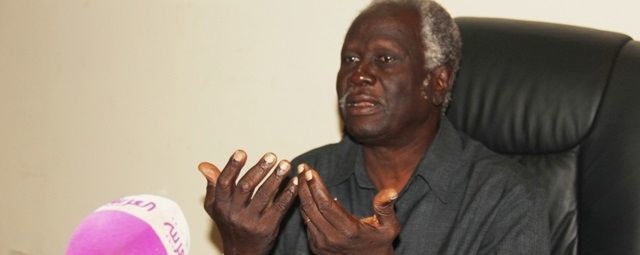Prof. Abednego Akok Kacuol, the chairman of the South Sudan Nation Elections Commission, says that the national election may be delayed beyond 2015 only if the parliament approves the delay. He also stressed that no election can be conducted without peace.
“If election is to be deferred according to the Transitional Constitution, which ends [their terms] in July 2015, that means the same Transitional Constitution will be amended to allow extension and census to be conducted,” the chairperson stated.
Although the Transitional Constitution does not give an end date for its own expiry (the ‘Transitional Period’), it does give an end date for the terms of currently governing officials. The constitution states in Article 66 that the end of the terms of the members of the National Legislature shall be four years from independence, meaning 8 July 2015. The same applies to state legislatures.
Under Article 100 of the Transitional Constitution, “The tenure of the office of the President of the Republic of South Sudan shall be four years, commencing from July 9, 2011.”
That means that without elections, the president, cabinet and entire national and state parliaments will cease to be the constitutionally legitimate government, starting less than 14 months from today.
In order to amend these terms of the transitional constitution, two-thirds of all members of both the National Legislative Assembly and Council of States would have to vote to approve an amendment. This could potentially allow them to extend their own terms, as well as that of the president.
Akok, speaking at a news conference in his office on Wednesday, pointed out that until now there has been no national census, which must be completed prior to the elections, according to the transitional constitution.
He noted also that the commission did not received any information from the president or parliament to defer the election.
Last week, President Salva Kiir while addressing citizens at Juba Airport said that elections may not be conducted early next year, 2015, as had been planned, but instead must be delayed several years, in order to give time for finding a political solution to the ongoing civil war and to carry out the census.
According to Abdengo, however, “Until now we did not receive any official document from the president telling us that the elections are deferred, but we have heard over the news,” he said.
The professor noted that the parliament must discuss and approve this measure.
Further he noted that the ongoing conflict in three states, Unity, Upper Nile and Jonglei, does not allow a conducive environment for an election to be fair and free election.
“The central part of the election is peace. For the election to be comfortable there must be peace and once there is peace the voters who are the sovereign body they will be free to move and cast their votes,” Akok stated.




